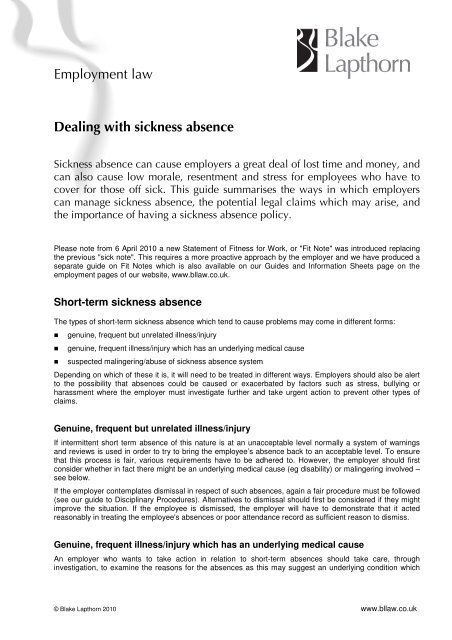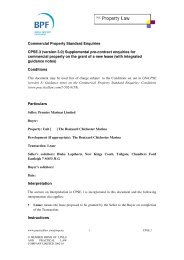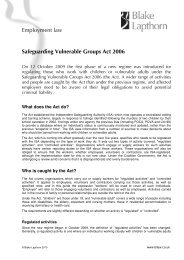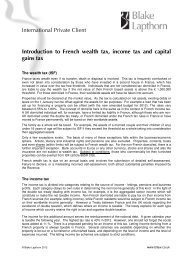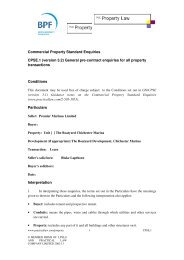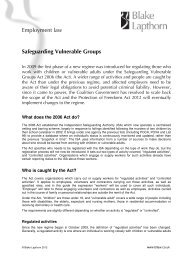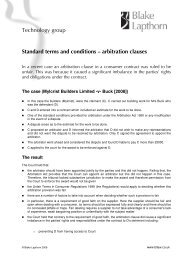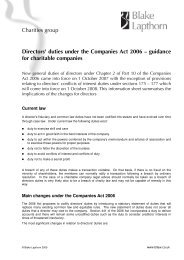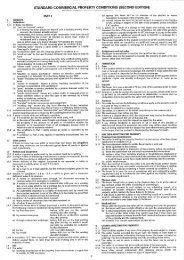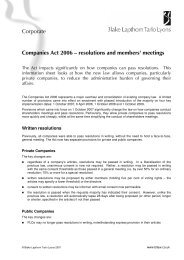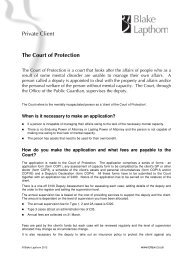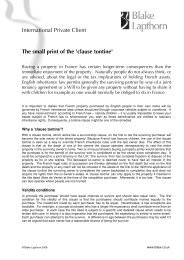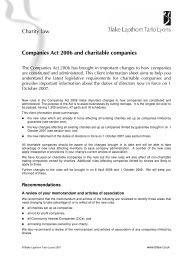Employment law Dealing with sickness absence - Blake Lapthorn
Employment law Dealing with sickness absence - Blake Lapthorn
Employment law Dealing with sickness absence - Blake Lapthorn
You also want an ePaper? Increase the reach of your titles
YUMPU automatically turns print PDFs into web optimized ePapers that Google loves.
<strong>Employment</strong> <strong>law</strong><strong>Dealing</strong> <strong>with</strong> <strong>sickness</strong> <strong>absence</strong>Sickness <strong>absence</strong> can cause employers a great deal of lost time and money, andcan also cause low morale, resentment and stress for employees who have tocover for those off sick. This guide summarises the ways in which employerscan manage <strong>sickness</strong> <strong>absence</strong>, the potential legal claims which may arise, andthe importance of having a <strong>sickness</strong> <strong>absence</strong> policy.Please note from 6 April 2010 a new Statement of Fitness for Work, or "Fit Note" was introduced replacingthe previous "sick note". This requires a more proactive approach by the employer and we have produced aseparate guide on Fit Notes which is also available on our Guides and Information Sheets page on theemployment pages of our website, www.bl<strong>law</strong>.co.uk.Short-term <strong>sickness</strong> <strong>absence</strong>The types of short-term <strong>sickness</strong> <strong>absence</strong> which tend to cause problems may come in different forms:genuine, frequent but unrelated illness/injurygenuine, frequent illness/injury which has an underlying medical causesuspected malingering/abuse of <strong>sickness</strong> <strong>absence</strong> systemDepending on which of these it is, it will need to be treated in different ways. Employers should also be alertto the possibility that <strong>absence</strong>s could be caused or exacerbated by factors such as stress, bullying orharassment where the employer must investigate further and take urgent action to prevent other types ofclaims.Genuine, frequent but unrelated illness/injuryIf intermittent short term <strong>absence</strong> of this nature is at an unacceptable level normally a system of warningsand reviews is used in order to try to bring the employee’s <strong>absence</strong> back to an acceptable level. To ensurethat this process is fair, various requirements have to be adhered to. However, the employer should firstconsider whether in fact there might be an underlying medical cause (eg disability) or malingering involved –see below.If the employer contemplates dismissal in respect of such <strong>absence</strong>s, again a fair procedure must be followed(see our guide to Disciplinary Procedures). Alternatives to dismissal should first be considered if they mightimprove the situation. If the employee is dismissed, the employer will have to demonstrate that it actedreasonably in treating the employee's <strong>absence</strong>s or poor attendance record as sufficient reason to dismiss.Genuine, frequent illness/injury which has an underlying medical causeAn employer who wants to take action in relation to short-term <strong>absence</strong>s should take care, throughinvestigation, to examine the reasons for the <strong>absence</strong>s as this may suggest an underlying condition which© <strong>Blake</strong> <strong>Lapthorn</strong> 2010 www.bl<strong>law</strong>.co.uk
could constitute a disability <strong>with</strong> the resulting obligations under the Disability Discrimination Act 1995 (DDA).If it is thought that this may be the case, it would be advisable to obtain a medical report (see below). If themedical report indicates that the employee does have a disability under the DDA, a system of warnings isunlikely to be appropriate and could result in a claim of un<strong>law</strong>ful discrimination.Suspected malingering/abuse of <strong>sickness</strong> <strong>absence</strong> systemThere may be instances where an employee’s conduct is inconsistent <strong>with</strong> the condition stipulated on adoctor’s certificate. For example you would not expect an employee certified as having a bad back to beseen laying a patio while on sick leave. Similarly, suspicious patterns of <strong>absence</strong> might occur on Mondays,or days coinciding <strong>with</strong> outside hobbies, or when a particular task or duty has to be carried out. Theemployer should exercise extreme care when dealing <strong>with</strong> such matters. If well-founded, the matter could bedealt <strong>with</strong> as a disciplinary issue (see our guide on Disciplinary Procedures), but please contact us beforeyou start this process so you can make an informed decision on whether and how to proceed <strong>with</strong> thisdifficult route.Long-term <strong>sickness</strong> <strong>absence</strong>Where an employee has been on <strong>sickness</strong> <strong>absence</strong> for an extended period of time an employer may beconsidering terminating the contract of employment. Special considerations apply to carry out this processfairly. In addition, many conditions resulting in long-term <strong>absence</strong> could also constitute a disability under theDisability Discrimination Act 1995 and as such an employer should take particular care to follow proceduralrequirements, as well as the consideration of "reasonable adjustments", in order to avoid any damagingdiscrimination claims.Medical ReportsMedical reports are extremely important in the process of dealing <strong>with</strong> long-term <strong>sickness</strong> <strong>absence</strong>, andsometimes also in the case of short-term <strong>sickness</strong> <strong>absence</strong>s. There are specific legal requirements to befollowed in how such a report may be obtained, depending on whether the report is from a doctor appointedby the employer or from the employee's own doctor. In either case, the employee's consent is required.There should therefore be a clause in every employment contract requiring an employee to consent to sucha report where it is reasonably requested. The request for a report must also be carefully drafted to ensurethat all the relevant questions are asked.Dismissal for long-term <strong>sickness</strong> <strong>absence</strong>Having obtained the medical report and consulted fully <strong>with</strong> the employee, the employer will have to considera number of factors to determine whether dismissal is appropriate and reasonable in each case.The dismissal of an employee on grounds of ill-health should be a last resort after all other options havebeen considered and tried where appropriate. Before deciding to dismiss, consideration should also be givento any potential risks if the employee's entitlement to contractual sick pay has not yet been exhausted.A fair procedure must be followed (see our guide to Disciplinary Procedures) and the employee must be keptinformed at all stages of the process.RecordsThroughout all these processes the employer should retain all <strong>absence</strong> records, correspondence, notes ofconversations and messages, together <strong>with</strong> any medical evidence which might be needed in the event of an<strong>Employment</strong> Tribunal claim. However this information must be kept confidentially and in accordance <strong>with</strong>data protection legislation.© <strong>Blake</strong> <strong>Lapthorn</strong> 2010 2
Potential claimsUnfair DismissalWith some notable exceptions, an employee only needs to have one year's service to make a claim forUnfair Dismissal. The compensatory award for unfair dismissal in most cases is limited to £65,300. Anemployer has to show that it had a fair reason to dismiss and followed a fair procedure.In relation to <strong>sickness</strong> <strong>absence</strong>, dismissal of an employee <strong>with</strong>out cause where Permanent Health Insuranceis available (which relies on continued employment) is likely to be an unfair dismissal.Disability DiscriminationUnlike a successful claim for Unfair Dismissal, compensation for a successful disability discrimination claimis unlimited, and an employee does not have to have been employed for any length of time in order to bringa claim. Particular care is therefore required. The legal definition of "disability" under the DDA is fairly wideand not always the same as medical definitions. As well as the duty not to discriminate un<strong>law</strong>fully against adisabled employee (whether directly or for a reason relating to their disability), employers are under apositive duty under the DDA to make "reasonable adjustments" for disabled employees. Because of thecomplex nature of the DDA and the potential financial exposure, action should not be taken <strong>with</strong>out ouradvice in cases where a disability is or might be involved.Personal injuryEmployers should be aware that, in particular where an employee is absent due to, for example, workrelatedstress, an employee may bring a personal injury claim against the employer. Consideration of thistype of claim is outside the scope of this information sheet, but please ask us for further details whereappropriate.Sickness <strong>absence</strong> policy<strong>Dealing</strong> <strong>with</strong> <strong>sickness</strong> <strong>absence</strong> of whatever kind can be a very tricky matter, <strong>with</strong> many potential pitfalls. It ishighly recommended that employers have a carefully-drafted <strong>sickness</strong> <strong>absence</strong> policy to minimise the risk ofclaims. The policy will help ensure that the way an employer deals <strong>with</strong> <strong>sickness</strong> <strong>absence</strong> is consistent andtransparent to employees and it can also act as a deterrent against abuse of the system. If enhanced sickpay is offered this requires careful drafting to prevent abuse of the system and excessive costs to theemployer.ContactFor further information or advice, please contact the employment team at employmentinfo@bl<strong>law</strong>.co.ukS O U T H A M P T O NO X F O R DL O N D O NP O R T S M O U T HT: 023 8090 8090T: 01865 248607T: 020 7405 2000T: 023 9222 1122F: 023 8090 8092F: 01865 728445F: 020 7814 9421F: 023 9222 1123This publication is not a substitute for detailed advice on specific transactions and problems and should not be taken as providing legaladvice on any of the topics discussed.<strong>Blake</strong> <strong>Lapthorn</strong> uses the information it holds about you to contact you where necessary if (for instance) you have registered to attend a© <strong>Blake</strong> <strong>Lapthorn</strong> 2010 3
seminar that we are hosting or have requested information regarding the services that we provide. We will also use it to administer,support, improve and develop our business and to contact you for your views on our services, as well as to let you know about otherproducts and services which we offer which may be of interest to you. We may send them by post, telephone or fax, email or SMS. Ifyou would rather NOT receive further information by any particular format, or at all, or if your details need updating, please contact JinaPatel on 020 7814 5449 or by email at jina.patel@bl<strong>law</strong>.co.uk.We will not disclose any of your personal identifiable information to any third parties <strong>with</strong>out your express permission to do so, unlesswe believe that we should do so to comply <strong>with</strong> the <strong>law</strong>.© <strong>Blake</strong> <strong>Lapthorn</strong> 2010 4


